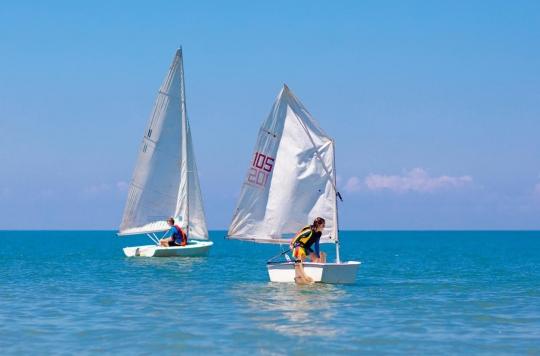Are you spending a holiday by the sea? Why not try sailing sports? Cardio, maintenance of joints and maintenance of cognitive abilities, nautical activities have many advantages for staying in shape.

- Sailing sports are good for the heart system and the joints.
- The continual observation of one’s environment and the concentration required to carry out the adjustments of one’s boat make these sports positive for cognitive functions.
- Going out to sea promotes relaxation and socialization.
Adrenaline, well-being and physical maintenance, here are the beneficial effects of sailing sports on health. If these disciplines are intended to be accessible to the greatest number – valid or not, and all generations combined – they do a lot of good for body mechanics. Sailing is a complex activity stimulating the centers of balance, observation and sensations.assures Doctor Hervé Roguedas, doctor of the French Sailing Federation.
However, if these disciplines on the water do not really require physical strength, they are no less demanding for the body. “A new practitioner will certainly feel very tired after sailing for an effort that he will have considered not very intense at the time, because it forces the body to constantly adapt the centers of balance, proprioception [perception consciente ou non de la position des différentes parties du corps, NDLR]explains Hervé Roguedas. Our practitioners say they feel a pleasant fatigue at the end of the day.”
Good for the heart and joints
For the Research Institute for Well-being, Medicine and Health Sport (IRBMS), muscular strength makes it possible to solicit “cardio-respiratory adaptations in endurance work”. An observation to which the federal doctor of the discipline abounds: “CSome supports are also very demanding on the heart, such as windsurfing or offshore racing boats.”
Sailing is much more demanding on flexibility, especially on joint mobility. “The practice of sailing sports is recognized as beneficial for the jointshe says. While sailing, there is no immediate pain and practitioners don’t think about it because their minds are elsewhere. They take pleasure in moving on the water or observing other boats.” The doctor puts forward the hypothesis that the constant work of the brain to keep balance – especially in living quarters – would require constant muscular exercise which would be beneficial for the joints. With this intuition, he hopes to carry out a scientific study that he hopes to be able to publish.
However, the intensity of the efforts varies according to the formats. “The more the support practiced will be demanding, foil supports in particular, the more the practitioner will have to be reactive and constantly attentive. The energy expenditure measured during a windsurfing race corresponds to that of an athlete during a 1500msays the federal doctor. The regatta is a very intense activity because it is both physically and mentally demanding. Normally it involves 7 to 10 races, often 3 per day, over several days… The effort is also measured over the long term.”
good for the head
To sail on the water, physical health is not always enough. Recreational sailors must also observe their environment to adapt their boat to the moods of the sea. Analytical, reaction and concentration faculties that boost the cognitive faculties of athletes. A reality that is all the more obvious during a crewed outing where good understanding and coordination of actions will allow the boat to move forward better.
However, the greatest benefit of water sports is undoubtedly to relieve the ailments of the mind. Breathing in a natural environment or observing the boats eliminates stress and anxiety. Beneficial airing of the mind.
.





-1740653386.jpg)











